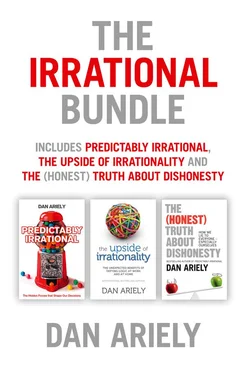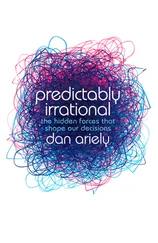Note: For this illustration, I used computerized faces, not those of the MIT students. And of course, the letters did not appear on the original sheets.
It did. Whenever I handed out a sheet that had a regular picture, its inferior version, and another regular picture, the participants said they would prefer to date the “regular” person—the one who was similar, but clearly superior, to the distorted version—over the other, undistorted person on the sheet. This was not just a close call—it happened 75 percent of the time.
To explain the decoy effect further, let me tell you something about bread-making machines. When Williams-Sonoma first introduced a home “bread bakery” machine (for $275), most consumers were not interested. What was a home bread-making machine, anyway? Was it good or bad? Did one really need home-baked bread? Why not just buy a fancy coffeemaker sitting nearby instead? Flustered by poor sales, the manufacturer of the bread machine brought in a marketing research firm, which suggested a fix: introduce an additional model of the bread maker, one that was not only larger but priced about 50 percent higher than the initial machine.
Now sales began to rise (along with many loaves of bread), though it was not the large bread maker that was being sold. Why? Simply because consumers now had two models of bread makers to choose from. Since one was clearly larger and much more expensive than the other, people didn’t have to make their decision in a vacuum. They could say: “Well, I don’t know much about bread makers, but I do know that if I were to buy one, I’d rather have the smaller one for less money.” And that’s when bread makers began to fly off the shelves. 2
OK for bread makers. But let’s take a look at the decoy effect in a completely different situation. What if you are single, and hope to appeal to as many attractive potential dating partners as possible at an upcoming singles event? My advice would be to bring a friend who has your basic physical characteristics (similar coloring, body type, facial features), but is slightly less attractive (–you).
Why? Because the folks you want to attract will have a hard time evaluating you with no comparables around. However, if you are compared with a “–you,” the decoy friend will do a lot to make you look better, not just in comparison with the decoy but also in general, and in comparison with all the other people around. It may sound irrational (and I can’t guarantee this), but the chances are good that you will get some extra attention. Of course, don’t just stop at looks. If great conversation will win the day, be sure to pick a friend for the singles event who can’t match your smooth delivery and rapier wit. By comparison, you’ll sound great.
Now that you know this secret, be careful: when a similar but better-looking friend of the same sex asks you to accompany him or her for a night out, you might wonder whether you have been invited along for your company or merely as a decoy.
RELATIVITY HELPS US make decisions in life. But it can also make us downright miserable. Why? Because jealousy and envy spring from comparing our lot in life with that of others.
It was for good reason, after all, that the Ten Commandments admonished, “Neither shall you desire your neighbor’s house nor field, or male or female slave, or donkey or anything that belongs to your neighbor.” This might just be the toughest commandment to follow, considering that by our very nature we are wired to compare.
Modern life makes this weakness even more pronounced. A few years ago, for instance, I met with one of the top executives of one of the big investment companies. Over the course of our conversation he mentioned that one of his employees had recently come to him to complain about his salary.
“How long have you been with the firm?” the executive asked the young man.
“Three years. I came straight from college,” was the answer.
“And when you joined us, how much did you expect to be making in three years?”
“I was hoping to be making about a hundred thousand.”
The executive eyed him curiously.
“And now you are making almost three hundred thousand, so how can you possibly complain?” he asked.
“Well,” the young man stammered, “it’s just that a couple of the guys at the desks next to me, they’re not any better than I am, and they are making three hundred ten.”
The executive shook his head.
An ironic aspect of this story is that in 1993, federal securities regulators forced companies, for the first time, to reveal details about the pay and perks of their top executives. The idea was that once pay was in the open, boards would be reluctant to give executives outrageous salaries and benefits. This, it was hoped, would stop the rise in executive compensation, which neither regulation, legislation, nor shareholder pressure had been able to stop. And indeed, it needed to stop: in 1976 the average CEO was paid 36 times as much as the average worker. By 1993, the average CEO was paid 131 times as much.
But guess what happened. Once salaries became public information, the media regularly ran special stories ranking CEOs by pay. Rather than suppressing the executive perks, the publicity had CEOs in America comparing their pay with that of everyone else. In response, executives’ salaries skyrocketed. The trend was further “helped” by compensation consulting firms (scathingly dubbed “Ratchet, Ratchet, and Bingo” by the investor Warren Buffett) that advised their CEO clients to demand outrageous raises. The result? Now the average CEO makes about 369 times as much as the average worker—about three times the salary before executive compensation went public.
Keeping that in mind, I had a few questions for the executive I met with.
“What would happen,” I ventured, “if the information in your salary database became known throughout the company?”
The executive looked at me with alarm. “We could get over a lot of things here—insider trading, financial scandals, and the like—but if everyone knew everyone else’s salary, it would be a true catastrophe. All but the highest-paid individual would feel underpaid—and I wouldn’t be surprised if they went out and looked for another job.”
Isn’t this odd? It has been shown repeatedly that the link between amount of salary and happiness is not as strong as one would expect it to be (in fact, it is rather weak). Studies even find that countries with the “happiest” people are not among those with the highest personal income. Yet we keep pushing toward a higher salary. Much of that can be blamed on sheer envy. As H. L. Mencken, the twentieth-century journalist, satirist, social critic, cynic, and freethinker noted, a man’s satisfaction with his salary depends on (are you ready for this?) whether he makes more than his wife’s sister’s husband. Why the wife’s sister’s husband? Because (and I have a feeling that Mencken’s wife kept him fully informed of her sister’s husband’s salary) this is a comparison that is salient and readily available. * Конец ознакомительного фрагмента. Текст предоставлен ООО «ЛитРес». Прочитайте эту книгу целиком, купив полную легальную версию на ЛитРес. Безопасно оплатить книгу можно банковской картой Visa, MasterCard, Maestro, со счета мобильного телефона, с платежного терминала, в салоне МТС или Связной, через PayPal, WebMoney, Яндекс.Деньги, QIWI Кошелек, бонусными картами или другим удобным Вам способом.
Читать дальше












